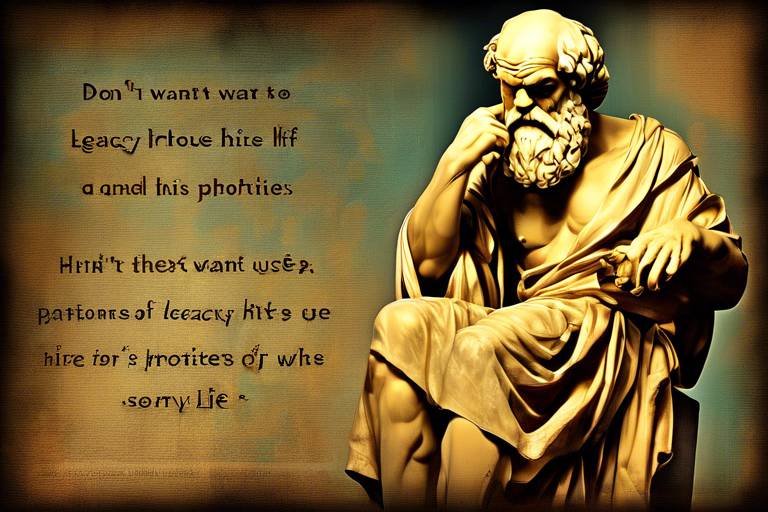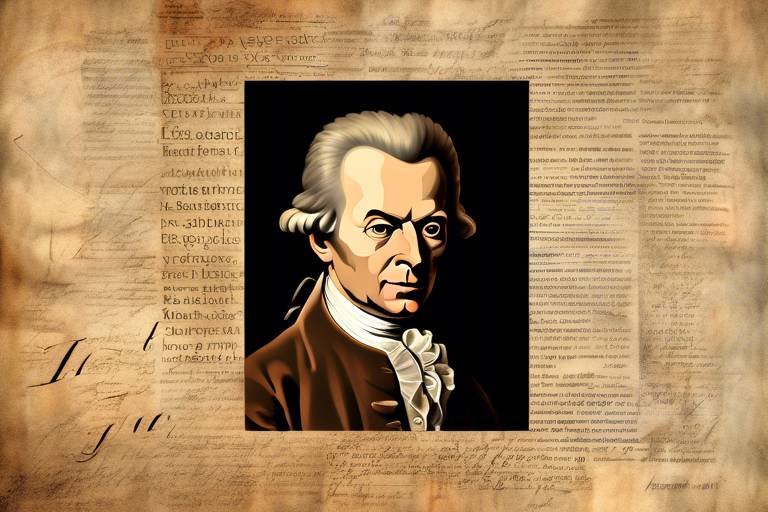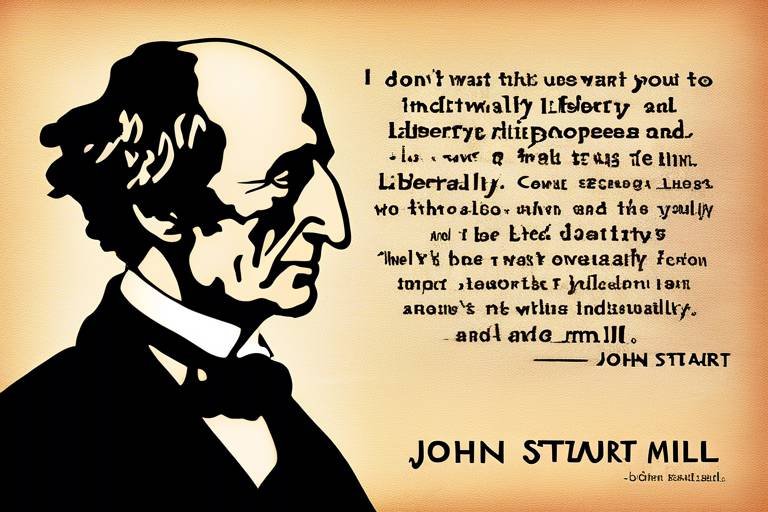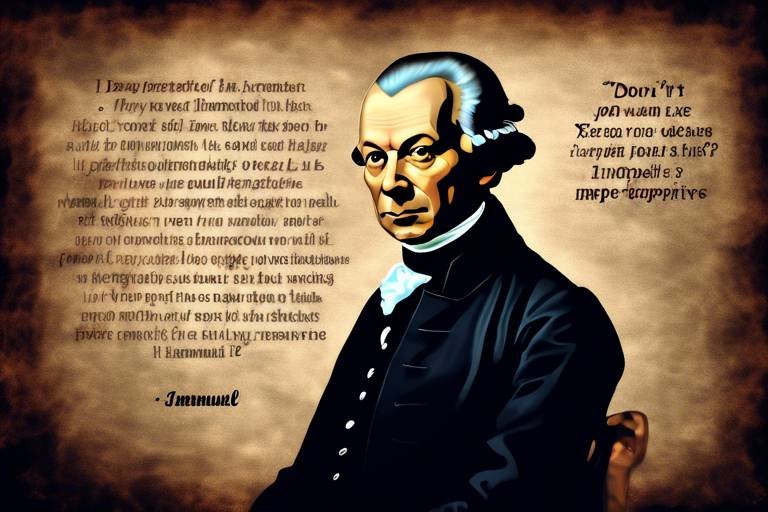Karl Popper and the Philosophy of Science: An Overview
Karl Popper, a towering figure in the realm of philosophy, has made significant contributions that continue to influence how we understand science today. Born in 1902 in Vienna, Popper's intellectual journey led him to challenge the established norms of scientific inquiry. His ideas about falsifiability, the demarcation problem, and the nature of scientific progress are not just theoretical musings; they are practical frameworks that shape scientific discourse. In this article, we will explore these concepts in detail, unraveling how they differentiate science from non-science and how they encourage a more rigorous approach to scientific investigation.
At the core of Popper’s philosophy is the notion that for a theory to be considered scientific, it must be falsifiable. This means that there must be a possibility to prove the theory wrong through observation or experimentation. Unlike the traditional view that emphasized verification, Popper flipped the script, suggesting that the strength of a scientific theory lies in its ability to withstand attempts at falsification. Imagine trying to prove a theory about gravity; while you can observe objects falling, the true test lies in attempting to find an exception. If you can’t, the theory gains credibility, but it never reaches absolute certainty. This perspective encourages scientists to remain skeptical and to constantly question their assumptions, fostering a dynamic environment of inquiry.
The demarcation problem is another crucial aspect of Popper's philosophy. It addresses the challenge of distinguishing between what constitutes science and what falls into the realm of pseudoscience or non-science. For instance, theories that cannot be tested or potentially disproven, such as astrology, do not meet Popper’s criteria for scientific legitimacy. This demarcation is essential because it helps maintain the integrity of scientific disciplines, ensuring that they are built on a foundation of testable and falsifiable propositions. By applying Popper's criteria, we can better navigate the sea of information and claims we encounter daily, allowing us to discern credible scientific inquiry from mere speculation.
Popper's critique of the inductive method also stands out as a significant contribution to scientific methodology. Traditionally, scientists relied heavily on induction—drawing general conclusions from specific observations. However, Popper argued that this approach is fundamentally flawed. He posited that no amount of positive observations can definitively prove a theory; instead, it is the potential for a single counterexample that can disprove it. This radical shift in thinking encourages scientists to focus on hypothesis-driven research, where formulating predictions and testing them rigorously becomes the norm. Such an approach not only enhances the robustness of scientific inquiry but also fosters a culture of critical thinking and skepticism.
In contrast to Thomas Kuhn’s idea of paradigm shifts, which suggests that science progresses through revolutionary changes, Popper viewed scientific advancement as a cumulative process of conjectures and refutations. According to Popper, science evolves through a series of bold hypotheses that are rigorously tested and refined over time. This perspective emphasizes the importance of continuous questioning and improvement, much like a sculptor chiseling away at a block of marble to reveal a masterpiece. Each failure to confirm a hypothesis is not a setback but a stepping stone toward a more refined understanding of the natural world.
Despite the profound impact of Popper’s ideas, they have not been without their controversies. Critics have pointed out that his strict criteria for scientific validity can exclude valuable areas of inquiry, such as historical sciences or certain aspects of psychology. Furthermore, the complexities of scientific practice often blur the lines between science and non-science, leading to ongoing debates about the applicability of Popper's philosophy in various fields. Nevertheless, defenders of Popper argue that his principles remain relevant, advocating for a scientific community that values critical scrutiny over dogmatic adherence to established theories.
In conclusion, Karl Popper's contributions to the philosophy of science are not merely academic; they resonate deeply within the fabric of scientific inquiry today. His emphasis on falsifiability, the demarcation problem, and the nature of scientific progress encourages a culture of skepticism and critical thinking that is essential for the advancement of knowledge. As we navigate an increasingly complex world filled with information, Popper's philosophy serves as a guiding light, reminding us of the importance of questioning, testing, and refining our understanding of the universe.
- What is falsifiability? Falsifiability is the principle that a theory must be able to be proven wrong through observation or experimentation to be considered scientific.
- Why is the demarcation problem important? The demarcation problem helps distinguish between science and non-science, ensuring that scientific inquiry is based on testable and falsifiable propositions.
- How did Popper critique the inductive method? Popper argued that no amount of positive observations can confirm a theory; rather, it is the potential for a single counterexample that can disprove it.
- What is the difference between Popper's view and Kuhn's paradigm shifts? While Kuhn suggests that science progresses through revolutionary changes, Popper believed it evolves through a cumulative process of conjectures and refutations.

The Concept of Falsifiability
Falsifiability is a cornerstone of Karl Popper's philosophy of science, acting as a litmus test that separates scientific theories from those that are merely speculative or metaphysical. In simple terms, a theory is considered scientific if it can be tested and potentially disproven. This idea radically shifted how we think about scientific inquiry. Imagine a game where the rules allow you to win only if you can prove your opponent wrong. That’s the essence of falsifiability—it's not about proving something right but about showing it could be wrong.
To grasp the significance of falsifiability, consider the following points:
- Testability: A theory must be structured in a way that allows for empirical testing. If a theory cannot be tested, it falls into the realm of the unscientific.
- Risk of Refutation: Theories must be bold enough to make predictions that could be proven false. The more a theory can be challenged, the more scientific credibility it gains.
- Dynamic Nature of Science: Falsifiability encourages a dynamic approach to scientific theories. Instead of seeking confirmation, scientists should actively look for evidence that contradicts their hypotheses.
Popper's emphasis on falsifiability has profound implications for how we conduct scientific research. It encourages scientists to adopt a skeptical mindset. For instance, if a scientist proposes a new theory about climate change, they should not only seek data that supports it but also actively search for data that might contradict it. This approach fosters a culture of rigorous testing and critical evaluation, which is essential for scientific advancement.
Moreover, falsifiability challenges the notion of scientific certainty. Unlike a mathematical proof that can be definitively proven, scientific theories remain open to revision. This fluidity is what makes science a continually evolving field. Think of it as a river that flows and changes course rather than a stagnant pond. Theories that withstand rigorous testing may become widely accepted, but they are never beyond challenge.
In conclusion, the concept of falsifiability is not just a philosophical abstraction; it serves as a guiding principle for scientific inquiry. By requiring that theories be testable and open to refutation, Popper's philosophy encourages a more robust and dynamic understanding of science. It reminds us that the journey of discovery is as important as the destination, and that questioning our assumptions is vital in the pursuit of knowledge.

The Demarcation Problem
The **demarcation problem** is one of the most intriguing challenges in the philosophy of science, and it revolves around a fundamental question: How do we distinguish between science and non-science? Karl Popper tackled this issue head-on, proposing that the **criterion of falsifiability** could serve as a clear dividing line. According to Popper, for a theory to be considered scientific, it must be testable and, crucially, falsifiable. This means that there should be a possible observation or experiment that could show the theory to be false. If a theory cannot be tested in this way, it falls into the realm of non-science or pseudoscience.
To illustrate this point, consider the difference between two statements: "All swans are white" and "There are swans that are not white." The first statement is a scientific hypothesis because it can be tested; if a single black swan is found, the hypothesis is falsified. In contrast, a statement like "The universe is governed by a benevolent force" cannot be tested or falsified, placing it outside the domain of scientific inquiry. This distinction is crucial as it helps scientists and philosophers navigate the often murky waters of what constitutes legitimate scientific exploration.
Popper's emphasis on falsifiability as a demarcation criterion has profound implications for scientific practice. It encourages scientists to formulate bold hypotheses and to actively seek out evidence that could potentially refute their theories. This approach fosters a culture of critical thinking and skepticism, which are essential for the advancement of knowledge. In this sense, the demarcation problem is not just an abstract philosophical issue; it has real-world consequences for how we conduct scientific research.
However, the demarcation problem is not without its challenges. Critics have pointed out that there are many scientific theories that are not easily falsifiable, particularly in fields like psychology or sociology, where the complexity of human behavior makes definitive testing difficult. Furthermore, some argue that Popper's strict criterion may exclude valuable areas of inquiry, such as historical sciences, where hypotheses cannot always be subjected to experimental testing.
Despite these criticisms, Popper's framework remains influential and continues to spark debate. Many contemporary philosophers of science still grapple with the implications of his ideas, seeking to refine or expand upon them. For instance, some propose a more nuanced view of demarcation that incorporates elements of **scientific realism** and acknowledges the role of theoretical constructs in scientific explanation.
In summary, the demarcation problem is a pivotal aspect of Popper's philosophy of science. By advocating for falsifiability as a key criterion, he not only provided a tool for distinguishing science from non-science but also encouraged a rigorous approach to scientific inquiry that prioritizes critical examination and empirical testing. As we continue to explore the boundaries of scientific knowledge, understanding the demarcation problem and its implications remains essential.
- What is the demarcation problem? The demarcation problem is the challenge of distinguishing scientific theories from non-scientific ones.
- Why is falsifiability important? Falsifiability is important because it allows for a clear criterion to test whether a theory can be considered scientific.
- Are there criticisms of Popper's demarcation criterion? Yes, critics argue that some scientific theories are not easily falsifiable and that Popper's strict criteria may exclude valuable areas of inquiry.
- How does the demarcation problem affect scientific practice? It encourages scientists to formulate testable hypotheses and promotes a culture of critical thinking and skepticism.

Popper's Critique of Induction
Karl Popper’s critique of induction is one of the cornerstones of his philosophy of science. Induction, the process of deriving general principles from specific observations, has long been a favored method in scientific inquiry. Think of it like trying to predict the weather based on past patterns: if it rained on the last five Mondays, one might conclude it will rain again next Monday. However, Popper argued that this method is fundamentally flawed. He believed that no amount of observations can ever definitively prove a theory to be true; instead, they can only provide support for it. This leads us to the crux of his argument: while we can gather evidence that suggests a theory might be correct, we can never achieve absolute certainty.
Popper famously stated that "all swans are white" could be considered a scientific theory only until one observes a black swan. The moment that black swan appears, the theory is falsified. Thus, rather than seeking to verify theories through induction, Popper proposed that scientists should focus on falsifiability—the ability to conceive an observation or an experiment that could refute the theory. This shift in focus from verification to falsification is revolutionary. In essence, Popper argued that science is not about accumulating proofs but about rigorously testing and attempting to disprove hypotheses.
To illustrate this further, consider the following table that summarizes the differences between inductive reasoning and Popper's falsification principle:
| Inductive Reasoning | Popper's Falsification |
|---|---|
| Generalizes from specific instances | Seeks to disprove theories |
| Leads to probable conclusions | Offers definitive refutations |
| Assumes accumulation of evidence leads to truth | Emphasizes the importance of critical testing |
Popper's critique of induction doesn't just stop at the theoretical level; it has practical implications for scientific methodology. By advocating for a hypothesis-driven approach, he pushed scientists to formulate bold conjectures and then rigorously test them. This method encourages a more dynamic and critical engagement with scientific theories, fostering an environment where ideas can be challenged and improved upon. In this way, Popper’s philosophy promotes a culture of skepticism and critical thinking, essential components in the pursuit of knowledge.
In conclusion, Popper's critique of induction reshaped our understanding of scientific inquiry. By highlighting the limitations of induction and insisting on the necessity of falsifiability, he provided a framework that not only clarifies the scientific method but also encourages a more robust and resilient approach to knowledge. In a world where certainty is often elusive, Popper’s insights remind us of the value of questioning and testing our beliefs.

Impact on Scientific Methodology
Karl Popper's influence on scientific methodology is nothing short of revolutionary. His advocacy for a hypothesis-driven approach reshaped how scientists formulate and test their theories. Unlike traditional methods that often relied heavily on induction, Popper proposed that science should be viewed as a series of bold conjectures followed by rigorous attempts to refute them. This perspective not only encouraged a more dynamic form of inquiry but also fostered a culture of skepticism and critical evaluation within the scientific community.
To illustrate this shift, consider the traditional inductive approach, where scientists would observe phenomena and derive general principles from these observations. Popper challenged this notion by asserting that no amount of empirical data could ever definitively verify a theory. Instead, he posited that a scientific theory gains credibility only when it survives attempts to be disproven. This idea of falsifiability became a cornerstone of his philosophy, serving as a litmus test for what constitutes a scientific theory.
One of the most significant impacts of Popper's methodology is its emphasis on the importance of testing and experimentation. In a Popperian framework, scientists are encouraged to design experiments that can potentially disprove their hypotheses. This proactive approach not only enhances the robustness of scientific inquiry but also leads to more innovative and creative thinking in research. An example of this can be seen in fields like physics and biology, where experimental design is crucial for validating theories.
Furthermore, Popper's ideas have led to the development of a more structured research process. The scientific method is now often viewed as a cycle of:
- Conjecture: Formulating a hypothesis based on existing knowledge.
- Critique: Subjecting the hypothesis to rigorous testing and scrutiny.
- Refutation: Attempting to disprove the hypothesis through experiments.
- Revision: Modifying the hypothesis based on the outcomes of tests.
This cycle encourages a continuous process of learning and adaptation, which is essential for scientific advancement. As researchers engage in this iterative process, they not only refine their theories but also contribute to the collective knowledge of their fields. The impact of Popper's philosophy can be seen in various scientific disciplines, from the natural sciences to social sciences, where the need for rigorous testing and validation is paramount.
In conclusion, Popper's contributions to scientific methodology have instilled a sense of discipline and rigor in scientific research. His emphasis on falsifiability and hypothesis testing has transformed how scientists approach their work, leading to more reliable and credible scientific outcomes. As we continue to navigate complex scientific challenges, Popper's legacy remains a guiding light, reminding us of the importance of skepticism and critical inquiry in the pursuit of knowledge.
- What is Karl Popper known for? Karl Popper is primarily known for his contributions to the philosophy of science, particularly his ideas on falsifiability and the scientific method.
- What does falsifiability mean? Falsifiability is the principle that a scientific theory must be able to be proven false through observation or experiment.
- How did Popper influence scientific methodology? Popper influenced scientific methodology by advocating for a hypothesis-driven approach that emphasizes testing and the potential for refutation.
- Why is critical thinking important in science? Critical thinking is essential in science as it encourages questioning, skepticism, and rigorous evaluation of theories, leading to more robust scientific understanding.

Scientific Progress and Paradigm Shifts
When we think about the evolution of science, the term paradigm shift often comes to mind, particularly due to Thomas Kuhn's influential work. However, Karl Popper had a different take on how scientific progress unfolds. Rather than viewing scientific advancement as a series of revolutionary changes that replace one paradigm with another, Popper emphasized a more cumulative process characterized by conjectures and refutations. This perspective is not just a minor detail; it fundamentally reshapes our understanding of how knowledge is built over time.
At the heart of Popper's philosophy lies the idea that science progresses through a cycle of proposing bold hypotheses and then rigorously testing them. When a hypothesis is put forward, it invites scrutiny and experimentation. If the hypothesis withstands the tests, it gains credibility; if it fails, it is discarded or revised. This process can be likened to a game of chess, where each move (or hypothesis) is played in the hopes of outmaneuvering the opponent (in this case, the forces of nature and the limits of our understanding).
Popper's model suggests that rather than waiting for a grand revolution to occur, scientists are constantly engaged in a dynamic process of refining their ideas. This is crucial because it allows for the gradual accumulation of knowledge, where each failed hypothesis contributes to a deeper understanding of the subject matter. For instance, consider how the transition from Newtonian physics to Einstein's theory of relativity didn't completely erase Newton's contributions but rather built upon them, demonstrating a more nuanced evolution of thought.
Moreover, Popper's view encourages scientists to embrace critical thinking and skepticism. In his eyes, the essence of scientific inquiry lies in the willingness to challenge existing theories and to accept that our understanding is always provisional. This contrasts sharply with the notion of a paradigm shift, which can imply a more dogmatic adherence to a particular framework until it is overthrown. Popper’s approach fosters an environment where questioning and testing are not just encouraged but are essential to the scientific endeavor.
To illustrate Popper's perspective on scientific progress, consider the following table that summarizes the key differences between his view and Kuhn's paradigm shifts:
| Aspect | Karl Popper | Thomas Kuhn |
|---|---|---|
| View of Progress | Cumulative (conjectures and refutations) | Revolutionary (paradigm shifts) |
| Nature of Theories | Provisional and falsifiable | Incommensurable paradigms |
| Role of Anomalies | Prompt revision or rejection of theories | Ignored until a crisis occurs |
| Scientific Community | Encourages skepticism and critical inquiry | Often resistant to change |
In summary, Popper's view of scientific progress as a continuous process of conjectures and refutations not only offers a clearer understanding of how science evolves but also highlights the importance of maintaining an open mind. It invites us to see science not as a rigid structure but as a living, breathing organism that grows and adapts over time. This perspective is vital in today's fast-paced world, where new discoveries and technologies emerge at an unprecedented rate. By embracing Popper's philosophy, we can foster a culture of inquiry that is essential for the advancement of knowledge.
- What is falsifiability? Falsifiability is the principle that a theory must be able to be proven false in order to be considered scientific.
- How does Popper's view differ from Kuhn's? Popper believed in cumulative scientific progress through conjectures and refutations, while Kuhn focused on revolutionary paradigm shifts.
- Why is critical thinking important in science? Critical thinking allows scientists to question existing theories and adapt their understanding based on new evidence.

Criticism and Controversies
Despite his profound influence on the philosophy of science, Karl Popper's ideas have not been without their share of criticism and controversy. Many scholars and scientists have raised questions about the practicality and applicability of his concepts, particularly his emphasis on falsifiability as the cornerstone of scientific inquiry. Critics argue that this criterion may be too restrictive, potentially excluding valuable scientific theories that do not lend themselves easily to falsification.
One of the primary criticisms revolves around the notion that some scientific theories, especially in fields like theoretical physics or astrophysics, often cannot be directly tested or falsified due to the limitations of current technology. For instance, theories about the existence of black holes or string theory may not be easily subjected to empirical testing. This raises the question: should we dismiss such theories simply because they don’t conform to Popper's strict criteria? Critics suggest that this could lead to a narrow view of what constitutes valid scientific inquiry.
Another point of contention is Popper's rejection of the inductive method. While he championed a deductive approach, many argue that induction plays a crucial role in scientific discovery. Induction allows scientists to formulate hypotheses based on observations, thus facilitating the generation of new theories. By dismissing induction, Popper may have overlooked an essential aspect of how science actually operates in practice.
Furthermore, Popper's philosophy has been criticized for its perceived lack of attention to the social and historical contexts of scientific development. Critics argue that science is not conducted in a vacuum; rather, it is influenced by a myriad of factors, including cultural, political, and social dynamics. This perspective suggests that Popper's focus on the logical structure of scientific theories may be too simplistic and does not adequately account for the complexities involved in scientific progress.
In addition to these criticisms, there have been ongoing debates about the implications of Popper's ideas for the broader field of philosophy. Some philosophers argue that his approach leads to an overly simplistic view of scientific progress, while others contend that it promotes a more rigorous and critical approach to knowledge acquisition.
Despite these criticisms, Popper's contributions to the philosophy of science continue to spark discussions and debates. His ideas challenge scientists and philosophers alike to think critically about the nature of scientific inquiry and the criteria we use to demarcate science from non-science. The controversies surrounding his work serve as a reminder that philosophy itself is an evolving field, constantly adapting to new ideas and challenges.
In light of these criticisms, it’s essential to consider the responses from Popper's defenders. They argue that although some theories may not be easily falsifiable at present, this does not undermine the value of the falsifiability criterion. Instead, they suggest that it encourages scientists to seek out ways to test and refine their theories, ultimately leading to a more robust understanding of the natural world.
In conclusion, while Popper's philosophy has faced significant criticism, it remains a pivotal point of reference in discussions about the nature of science. The ongoing debates surrounding his ideas illustrate the dynamic interplay between science and philosophy, highlighting the importance of critical thinking and open discourse in the pursuit of knowledge.
- What is falsifiability?
Falsifiability is the principle that a theory must be testable and capable of being proven false. If a theory cannot be falsified, it is considered non-scientific. - Why did Popper criticize induction?
Popper believed that induction could not reliably lead to scientific knowledge because it relies on the assumption that future observations will resemble past ones, which is not guaranteed. - How did Popper influence scientific methodology?
Popper advocated for a hypothesis-driven approach, emphasizing the importance of testing and refuting theories rather than merely confirming them through observations.

Responses to Criticism
Throughout the years, Karl Popper's philosophy has been met with a fair share of skepticism and critique. However, his defenders have risen to the occasion, providing robust responses that highlight the enduring relevance of his ideas. One of the most significant defenses revolves around the notion of falsifiability. Critics often argue that Popper's strict criterion excludes many scientific theories that are widely accepted. However, defenders assert that Popper did not intend for falsifiability to serve as a rigid boundary but rather as a guiding principle that encourages scientific inquiry to remain open to testing and revision.
Moreover, Popper's supporters emphasize that his critique of induction is not a dismissal of empirical observation but a call for a more rigorous approach to scientific methodology. They argue that by focusing on falsifiability, scientists are encouraged to formulate hypotheses that can be tested and potentially disproven, leading to a more dynamic and progressive scientific discourse. This methodology, they argue, fosters a culture of critical thinking and skepticism, which is essential for scientific advancement.
Another common criticism of Popper's work is that it overlooks the role of scientific communities and the social dimensions of science. In response, Popper's defenders point out that while he emphasized individual theories and their testing, he did not disregard the collaborative nature of science. They argue that scientific communities play a vital role in the process of conjectures and refutations, where ideas are debated, refined, and occasionally discarded based on rigorous testing and peer review.
To further illustrate the resilience of Popper's philosophy, consider the following table that summarizes some of the key criticisms and the corresponding responses from his supporters:
| Criticism | Response |
|---|---|
| Falsifiability is too restrictive. | It serves as a guiding principle for scientific inquiry, promoting rigorous testing. |
| Neglects the social aspects of science. | Popper acknowledges the role of scientific communities in refining theories. |
| Overemphasis on refutation over verification. | Encourages a dynamic approach that values critical testing over mere acceptance. |
Additionally, defenders of Popper's philosophy often highlight how his ideas have influenced contemporary scientific practices. For instance, many fields, such as psychology and economics, have adopted hypothesis-driven research models that align with Popper's vision. This indicates that despite the criticisms, his philosophy has found practical application, proving its worth in real-world scientific endeavors.
In conclusion, while Karl Popper's philosophy has not been without its challenges, the responses to these criticisms underscore the robustness and adaptability of his ideas. His emphasis on falsifiability and critical thinking continues to resonate within the scientific community, ensuring that his legacy remains a vital part of the ongoing discourse in the philosophy of science.
- What is falsifiability? Falsifiability is the principle that for a theory to be considered scientific, it must be able to be proven false through observation or experimentation.
- How did Popper influence scientific methodology? Popper advocated for a hypothesis-driven approach, encouraging scientists to formulate theories that could be rigorously tested and potentially disproven.
- What is the demarcation problem? The demarcation problem involves distinguishing between scientific and non-scientific theories, a challenge that Popper addressed through his criterion of falsifiability.
- Why is critical thinking important in science? Critical thinking fosters a culture of skepticism and inquiry, essential for scientific progress and the refinement of theories.
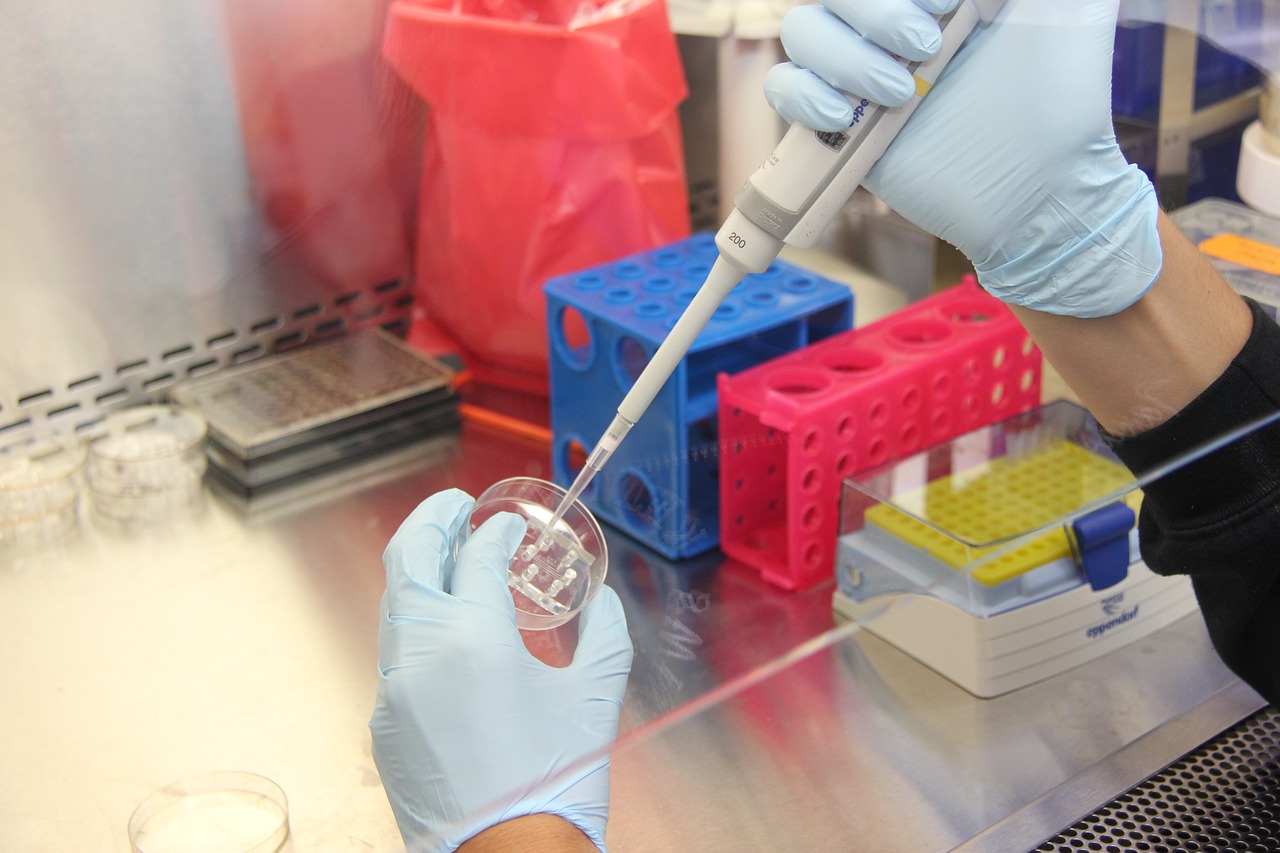
Legacy and Influence
Karl Popper's impact on the philosophy of science is nothing short of monumental. His ideas have not only reshaped how scientists approach their work but have also influenced various fields beyond science, including politics, education, and even art. One of the most significant aspects of Popper's legacy is his emphasis on critical rationalism, which advocates for a method of inquiry that is inherently skeptical and open to challenge. This approach encourages scientists and thinkers alike to constantly question their assumptions and to remain vigilant against dogma.
Popper's concept of falsifiability remains a cornerstone in scientific discourse, serving as a litmus test for distinguishing between scientific and non-scientific claims. His assertion that a theory must be testable and, importantly, refutable has led to a more rigorous scientific method. In fact, many contemporary scientists and philosophers utilize Popper's ideas as a guiding principle when formulating hypotheses. For instance, in fields like psychology and sociology, where variables can be complex and intertwined, the need for testable predictions is crucial for valid research.
Moreover, Popper's critique of induction has sparked a plethora of discussions and debates that continue to resonate today. His assertion that no amount of observational data can conclusively verify a theory has encouraged scientists to adopt a more cautious and critical stance towards their findings. This has led to an evolution in scientific methodology, where the focus has shifted from mere observation to a more dynamic process of conjectures and refutations.
To illustrate the breadth of Popper's influence, consider the following areas:
- Education: Popper's ideas have influenced educational philosophies that promote critical thinking over rote memorization, encouraging students to engage with ideas actively.
- Politics: His thoughts on open societies and the importance of democratic governance have been foundational in political theory, advocating for systems that allow for dissent and debate.
- Science Communication: Popper's work has fostered a better understanding of how science communicates uncertainty, which is vital in an age of misinformation.
In summary, Karl Popper's legacy is characterized by a commitment to skepticism and critical inquiry. His influence is felt not only in the halls of academia but also in everyday conversations about science and its role in society. As we navigate an increasingly complex world, Popper's emphasis on questioning and testing ideas remains more relevant than ever. His work serves as a reminder that the pursuit of knowledge is a continuous journey, fraught with challenges but also rich with opportunities for discovery.
- What is Karl Popper best known for?
Popper is best known for his philosophy of science, particularly his ideas on falsifiability and critical rationalism. - How did Popper influence scientific methodology?
He advocated for a hypothesis-driven approach, emphasizing that scientific theories should be testable and refutable. - What is the demarcation problem?
The demarcation problem refers to the challenge of distinguishing between science and non-science, which Popper addressed through his falsifiability criterion. - Why is critical thinking important in Popper's philosophy?
Critical thinking is vital as it encourages questioning and testing of ideas, which Popper believed are essential for scientific progress.

Conclusion: The Relevance of Popper's Philosophy
In the ever-evolving landscape of science and philosophy, Karl Popper's contributions remain profoundly relevant. His emphasis on falsifiability as a cornerstone of scientific inquiry challenges us to think critically about the theories we accept. In a world where information is abundant yet often misleading, Popper's insistence on skepticism and rigorous testing acts as a beacon for both scientists and the general public alike. By advocating for a methodology that prioritizes hypothesis-driven research, he has paved the way for a more disciplined approach to science that values questioning over dogma.
Popper's ideas encourage us to embrace uncertainty and view scientific progress not as a linear path, but as a dynamic interplay of ideas. This perspective is crucial, especially in contemporary discussions surrounding climate change, medical research, and technological advancements. As we face complex global challenges, the ability to critically evaluate competing theories and adapt our understanding based on new evidence is more important than ever. In this light, Popper's philosophy serves as a reminder that science is not just about accumulating knowledge, but also about refining our understanding through conjectures and refutations.
Moreover, the relevance of Popper's philosophy extends beyond the realm of science. His thoughts on the demarcation problem prompt us to question what constitutes knowledge in various fields, including social sciences and humanities. By applying his principles, we can better navigate the murky waters of pseudoscience and misinformation that often plague public discourse.
In summary, Popper's legacy is not merely an academic concern but a vital part of our ongoing quest for knowledge. His philosophy encourages a culture of critical thinking, where questioning is not just welcomed but essential. As we continue to grapple with new challenges and information, embracing Popper's ideas can lead us toward a more informed and rational society.
- What is falsifiability?
Falsifiability is the principle that a theory must be able to be proven false in order to be considered scientific. It distinguishes scientific theories from those that are non-scientific.
- Why is Popper's philosophy important today?
Popper's philosophy is crucial today as it promotes critical thinking and skepticism, helping us navigate the vast amounts of information and misinformation in our world.
- How did Popper critique induction?
Popper argued that scientific theories cannot be verified solely through observation; instead, they must be testable and falsifiable.
- What is the demarcation problem?
The demarcation problem addresses the challenge of distinguishing between science and non-science, a key issue in the philosophy of science.
- How has Popper influenced modern science?
Popper's ideas have led to a more hypothesis-driven approach in scientific research, emphasizing the importance of testing and refining theories.
Frequently Asked Questions
- What is Karl Popper's concept of falsifiability?
Falsifiability is a key idea in Popper's philosophy of science. It suggests that for a theory to be considered scientific, it must be testable and capable of being proven false. In simpler terms, if you can’t imagine a scenario that would prove a theory wrong, then it’s not scientific. This criterion helps scientists distinguish between genuine scientific theories and those that are merely speculative or untestable.
- How does Popper address the demarcation problem?
The demarcation problem is all about figuring out what counts as science versus non-science. Popper tackled this by proposing falsifiability as the litmus test. If a theory can be tested and potentially disproven, it qualifies as science. This approach has sparked much debate, but it remains a cornerstone of Popper's philosophy, influencing how we think about scientific inquiry today.
- What is Popper's critique of induction?
Popper famously critiqued the inductive method, which relies on drawing general conclusions from specific observations. He argued that no matter how many observations you make, you can never confirm a theory with absolute certainty. Instead, he believed that science progresses through bold conjectures and rigorous attempts to refute them, which leads to a more robust understanding of the world.
- How did Popper influence scientific methodology?
Popper's ideas brought about a significant shift in scientific methodology. He championed a hypothesis-driven approach, where scientists propose theories and then seek to test them. This has led to a more dynamic and critical form of scientific inquiry, encouraging researchers to actively seek out evidence that could disprove their theories rather than just looking for confirmation.
- What is Popper's view on scientific progress?
Unlike Thomas Kuhn, who emphasized paradigm shifts, Popper viewed scientific progress as a cumulative process of conjectures and refutations. He believed that science evolves through a cycle of proposing theories, testing them, and discarding those that fail. This perspective highlights the importance of critical thinking and skepticism in advancing our understanding of the natural world.
- What are some criticisms of Popper's philosophy?
Despite his influential ideas, Popper's philosophy has faced various criticisms. Some argue that his strict criterion of falsifiability is too limiting and doesn’t account for the complexities of scientific practice. Others point out that many scientific theories, especially in fields like psychology and sociology, don't easily lend themselves to falsification, raising questions about the applicability of his ideas across all scientific disciplines.
- How have defenders responded to criticism of Popper's work?
Defenders of Popper's philosophy have offered various responses to critiques, emphasizing the importance of falsifiability as a guiding principle rather than a strict rule. They argue that while not every scientific theory may fit neatly into his framework, the emphasis on critical testing and skepticism remains vital for scientific progress. This ongoing dialogue keeps Popper's ideas relevant in contemporary philosophy and science discussions.
- What is Karl Popper's legacy in the philosophy of science?
Popper's legacy is profound and continues to shape discussions in both philosophy and science. His emphasis on critical thinking, skepticism, and the importance of testing hypotheses has influenced countless scientists and philosophers. His ideas encourage a more rigorous and questioning approach to knowledge, ensuring that the pursuit of understanding remains dynamic and open to challenge.
- Why is Popper's philosophy still relevant today?
In today's scientific landscape, Popper's philosophy is more relevant than ever. With the rapid pace of scientific discovery and the complexity of modern theories, the need for critical thinking and a willingness to question established ideas is crucial. Popper's insistence on the importance of falsifiability and skepticism serves as a reminder that science is an evolving field, always open to new evidence and ideas.




